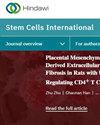间充质干细胞中不同水平的自噬活性与特发性肺纤维化的进展有关
IF 3.3
3区 医学
Q2 CELL & TISSUE ENGINEERING
引用次数: 0
摘要
特发性肺纤维化(IPF)是一种与年龄有关的肺间质疾病,主要发生在65岁以上的人群中,目前尚缺乏有效的治疗药物。研究表明,间充质干细胞(MSCs)包括肺泡上皮细胞(AECs)可以发挥修复功能。然而,间充质干细胞因其独特的老化特征而丧失修复功能,最终导致 IPF 的发展。最近的突破性研究发现,自噬活性的程度会影响间充质干细胞的更新和衰老,并决定 IPF 的预后。自噬是一种依赖溶酶体的途径,介导细胞内物质的降解和再循环,是真核细胞非核(胞质)部分更新的有效途径,对维持细胞稳态至关重要,也是调节间充质干细胞功能的潜在靶点。因此,本综述重点研究间充质干细胞自噬活性的变化,阐明自噬与间充质干细胞健康状况的关系以及自噬活性对间充质干细胞衰老和IPF的影响,为促进间充质干细胞的临床应用提供理论依据。本文章由计算机程序翻译,如有差异,请以英文原文为准。
Different Levels of Autophagy Activity in Mesenchymal Stem Cells Are Involved in the Progression of Idiopathic Pulmonary Fibrosis
Idiopathic pulmonary fibrosis (IPF) is an age-related lung interstitial disease that occurs predominantly in people over 65 years of age and for which there is a lack of effective therapeutic agents. It has demonstrated that mesenchymal stem cells (MSCs) including alveolar epithelial cells (AECs) can perform repair functions. However, MSCs lose their repair functions due to their distinctive aging characteristics, eventually leading to the progression of IPF. Recent breakthroughs have revealed that the degree of autophagic activity influences the renewal and aging of MSCs and determines the prognosis of IPF. Autophagy is a lysosome-dependent pathway that mediates the degradation and recycling of intracellular material and is an efficient way to renew the nonnuclear (cytoplasmic) part of eukaryotic cells, which is essential for maintaining cellular homeostasis and is a potential target for regulating MSCs function. Therefore, this review focuses on the changes in autophagic activity of MSCs, clarifies the relationship between autophagy and health status of MSCs and the effect of autophagic activity on MSCs senescence and IPF, providing a theoretical basis for promoting the clinical application of MSCs.
求助全文
通过发布文献求助,成功后即可免费获取论文全文。
去求助
来源期刊

Stem Cells International
CELL & TISSUE ENGINEERING-
CiteScore
8.10
自引率
2.30%
发文量
188
审稿时长
18 weeks
期刊介绍:
Stem Cells International is a peer-reviewed, Open Access journal that publishes original research articles, review articles, and clinical studies in all areas of stem cell biology and applications. The journal will consider basic, translational, and clinical research, including animal models and clinical trials.
Topics covered include, but are not limited to: embryonic stem cells; induced pluripotent stem cells; tissue-specific stem cells; stem cell differentiation; genetics and epigenetics; cancer stem cells; stem cell technologies; ethical, legal, and social issues.
 求助内容:
求助内容: 应助结果提醒方式:
应助结果提醒方式:


